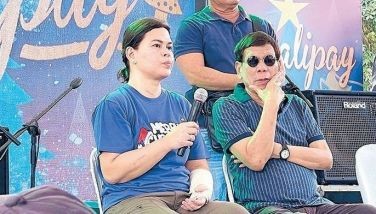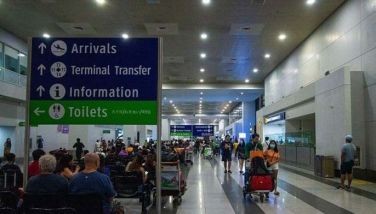Police to arm civilians vs kidnaps
November 15, 2001 | 12:00am
The police will soon field armed civilians, particularly members of the Filipino-Chinese community in Metro Manila, as part of a bigger government program to combat kidnapping.
This developed as President Arroyo revealed that she would enlist the help of the United States, Britain and Israel to train Philippine policemen in anti-kidnapping operations.
At the same time, Philippine National Police (PNP) chief Director General Leandro Mendoza reactivated the elite Task Force Dragon, the counterpart of the defunct Presidential Anti-Crime Commission, to undertake a vigorous crackdown on organized crime, notably kidnapping for ransom.
Victims of kidnapping for ransom have mostly been wealthy Filipino-Chinese businessmen or members of their family
Interior and Local Government Secretary Jose Lina Jr. explained that tapping civilians as anti-kidnap agents is part of the government’s plan to break the backbone of criminal syndicates in the country.
The scheme is akin to the use of the Civilian Armed Forces Geographical Unit or militia groups created in areas severely affected by communist and Muslim separatist insurgencies.
"As part of the commitment of the government (to stamp out criminality), we have decided to arm selected civilian agents, especially (in areas) where kidnapping abounds," Lina said.
He clarified that the armed civilians were basically self-defense units with limited territorial jurisdiction.
The vigilantes will be allowed to carry short firearms after they have passed rigid screening by the PNP.
Lina said the scheme, adopted upon the request of the Filipino-Chinese community itself, was covered by an executive order enabling government authorities to utilize civilians in anti-crime operations.
Complementing the stepped up anti-crime campaign would be the offer of rewards for information leading to the arrest of suspects, increased police visibility and the procurement of additional equipment for the law enforcers.
"While the police operate on guts, we need to have enough resources to make the campaign more effective," Lina told reporters.
Citing PNP records, Lina said this year’s kidnapping incidents rose significantly compared to last year’s figure.
Mendoza said he was assuming full responsibility for the rise in kidnapping incidents.
"There is no reason why we cannot accept the responsibility. We will go after all the networks of the KFR (kidnapping for ransom) syndicates, whoever they are; whether policemen, soldiers, court personnel, or even politicians," he said.
Mendoza added that he has chosen capable and committed policemen to track down the kidnappers.
Addressing the Philippine Chamber of Commerce and Industry, the President said she will ask the US Federal Bureau of Investigation to beef up its personnel here so it could help Philippine law enforcers fight kidnappers.
Mrs. Arroyo left last night for a nine-day visit to the US.
She said she has also asked the Hong Kong police to train their Philippine counterparts, and that she intends to do the same with Scotland Yard.
Citing the arrest of some foreigners as suspected abductors, Mrs. Arroyo said kidnapping has become a transnational crime, hence international cooperation has become necessary.
The President also said she has authorized the recruitment of 1,300 policemen in addition to the 400 already hired to further strengthen law enforcement in Metro Manila. —With Marichu Villanueva
This developed as President Arroyo revealed that she would enlist the help of the United States, Britain and Israel to train Philippine policemen in anti-kidnapping operations.
At the same time, Philippine National Police (PNP) chief Director General Leandro Mendoza reactivated the elite Task Force Dragon, the counterpart of the defunct Presidential Anti-Crime Commission, to undertake a vigorous crackdown on organized crime, notably kidnapping for ransom.
Victims of kidnapping for ransom have mostly been wealthy Filipino-Chinese businessmen or members of their family
Interior and Local Government Secretary Jose Lina Jr. explained that tapping civilians as anti-kidnap agents is part of the government’s plan to break the backbone of criminal syndicates in the country.
The scheme is akin to the use of the Civilian Armed Forces Geographical Unit or militia groups created in areas severely affected by communist and Muslim separatist insurgencies.
"As part of the commitment of the government (to stamp out criminality), we have decided to arm selected civilian agents, especially (in areas) where kidnapping abounds," Lina said.
He clarified that the armed civilians were basically self-defense units with limited territorial jurisdiction.
The vigilantes will be allowed to carry short firearms after they have passed rigid screening by the PNP.
Lina said the scheme, adopted upon the request of the Filipino-Chinese community itself, was covered by an executive order enabling government authorities to utilize civilians in anti-crime operations.
Complementing the stepped up anti-crime campaign would be the offer of rewards for information leading to the arrest of suspects, increased police visibility and the procurement of additional equipment for the law enforcers.
"While the police operate on guts, we need to have enough resources to make the campaign more effective," Lina told reporters.
Citing PNP records, Lina said this year’s kidnapping incidents rose significantly compared to last year’s figure.
Mendoza said he was assuming full responsibility for the rise in kidnapping incidents.
"There is no reason why we cannot accept the responsibility. We will go after all the networks of the KFR (kidnapping for ransom) syndicates, whoever they are; whether policemen, soldiers, court personnel, or even politicians," he said.
Mendoza added that he has chosen capable and committed policemen to track down the kidnappers.
Addressing the Philippine Chamber of Commerce and Industry, the President said she will ask the US Federal Bureau of Investigation to beef up its personnel here so it could help Philippine law enforcers fight kidnappers.
Mrs. Arroyo left last night for a nine-day visit to the US.
She said she has also asked the Hong Kong police to train their Philippine counterparts, and that she intends to do the same with Scotland Yard.
Citing the arrest of some foreigners as suspected abductors, Mrs. Arroyo said kidnapping has become a transnational crime, hence international cooperation has become necessary.
The President also said she has authorized the recruitment of 1,300 policemen in addition to the 400 already hired to further strengthen law enforcement in Metro Manila. —With Marichu Villanueva
BrandSpace Articles
<
>
- Latest
- Trending
Trending
Latest
Trending
Latest
Recommended





























